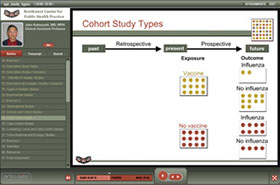Description
Epidemiologic case-control studies are used to identify factors that may contribute to a medical condition. Epidemiological studies are categorized as either descriptive or analytic. This course describes the main elements of descriptive and analytic epidemiology and their associated study types briefly and clearly. In addition to case-control studies, you'll also learn about eight other commonly used study types, including the basics of each type of study and how each is used. This is part of a nine-part series on epidemiology.
Learning Objectives
After completing this course, you should be able to:
- List the differences between descriptive and analytic epidemiology
- Describe the main types of epidemiologic studies and their uses
- Identify and provide examples of person, place, and time in descriptive studies
- Describe the main differences among case-control, cohort studies, and environmental studies
Intended Audience
Public health professionals who want to increase their familiarity with the basic concepts of epidemiology. It is recommended that people be familiar with material presented in the following module: Data Interpretation for Public Health Professionals.
Epidemiology Series
Data Interpretation for Public Health Professionals
Basic Infectious Disease Concepts in Epidemiology
Introduction to Public Health Surveillance
Introduction to Outbreak Investigation
Measuring Risk in Epidemiology
Cause and Effect in Epidemiology
Screening in Public Health Practice
Format
Web-based, Flash presentation. This online course has audio narration and interactive exercises and scenarios. This course should take about 30 minutes to complete.
Course Instructor
John Kobayashi, PhD, MPH
Clinical Assistant Professor
Northwest Center for Public Health Practice
University of Washington School of Public Health
Technical Requirements
This course requires certain software and browser plugins to be installed. See our Technical Requirements.
Accessibility
This online training course is audio narrated. A print version is available in the Supplemental Material section at the bottom of this page. Please note that the print version does not include interactive exercises, quizzes, or the final assessment. To receive a print version of the quizzes in this course, or if you have any difficulties, please contact nwcphp@uw.edu.
